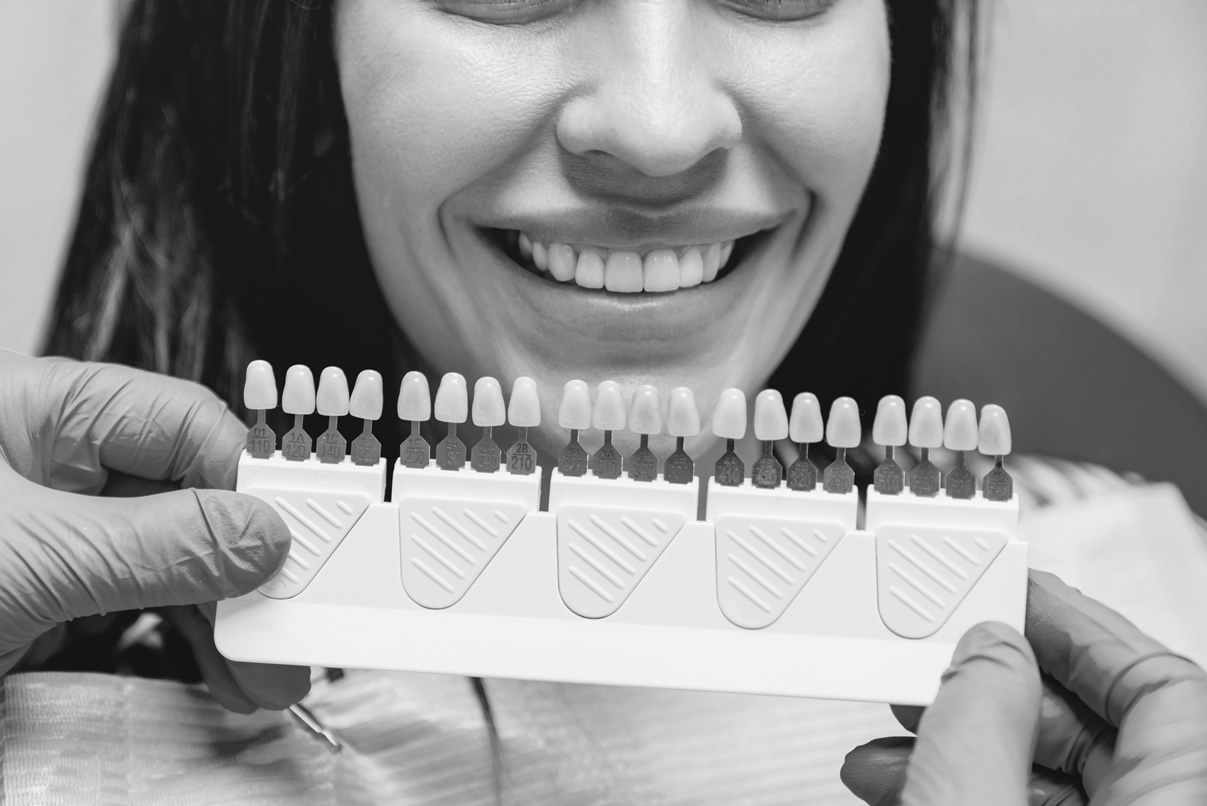Teeth whitening treatment in Dombivli and Palawa City
A bright, dazzling smile can make a lasting impression. However, over time, our teeth can become stained or discolored due to various factors such as aging, dietary habits, and lifestyle choices. Fortunately, teeth whitening procedures offer a safe and effective solution to restore the natural whiteness of your teeth. In this blog, we will delve into the indications, contraindications, procedure, teeth whitening options, alternative treatments, and the reasons why Care and Cure Dental Clinic is an excellent choice for teeth whitening. Click here to get the direction of the best teeth whitening treatment dental clinic near you.

What Exactly Is
Teeth Whitening Treatment?
Teeth whitening refers to various procedures and techniques used to lighten the color of teeth and remove stains or discoloration. It is a cosmetic dental procedure aimed at improving the appearance of teeth and enhancing one’s smile.
Teeth whitening treatments aim to remove stains and lighten the natural color of teeth. It’s important to note that teeth whitening treatments may not be suitable for everyone. People with certain dental conditions, such as gum disease, cavities, or sensitive teeth, may need to address these issues before undergoing teeth whitening. It’s recommended to consult with a dentist to determine the most appropriate and safe teeth whitening method for your specific needs.
Other Dental Services
The teeth whitening procedure typically involves the following steps:
- Dental Examination: Dr.Tejal Thorve will examine your teeth and gums to ensure they are healthy and determine the suitability of teeth whitening for you.
- Teeth Cleaning: Professional teeth cleaning is performed to remove any plaque, tartar, or debris that could interfere with the whitening process.
- Application of Whitening Agent: A whitening agent containing hydrogen peroxide or carbamide peroxide is applied to the teeth. The concentration and method of application may vary depending on the chosen whitening option.
- Activation of Whitening Agent: Some whitening techniques use a special light or laser to activate the whitening agent, enhancing its effectiveness.
- Multiple Sessions (Optional): In some cases, multiple sessions may be required to achieve the desired level of whiteness.
- Post-Treatment Care: Your dentist will provide instructions on how to maintain the results and avoid staining or discoloration in the future.
Alternative Treatments –
In some cases, teeth whitening may not be the most suitable option. Alternative treatments may include:
- Dental Veneers: These thin shells are placed over the front surface of the teeth, masking discoloration and providing a natural-looking, white smile.
- Dental Bonding: Tooth-colored resin is applied to the teeth and shaped to improve their appearance, including color.
- Porcelain Crowns: Crowns can be used to cover severely discolored teeth, restoring both color and structure.
Common indications for teeth whitening include:
- Extrinsic Stains: These are surface stains caused by food, beverages like coffee and tea, tobacco, and poor oral hygiene habits.
- Age-related Discoloration: Teeth naturally darken with age as the enamel wears down, revealing the dentin underneath.
- Intrinsic Stains: These are stains that occur within the tooth structure, often caused by excessive fluoride during tooth development or the use of certain medications.
Contraindications for Teeth Whitening:
While teeth whitening is a safe procedure for most people, it may not be suitable for everyone. Contraindications may include:
- Tooth Sensitivity: Individuals with severe tooth sensitivity may experience discomfort during or after the whitening process.
- Gum Disease or Tooth Decay: Teeth whitening is not recommended for individuals with active gum disease or untreated tooth decay.
- Pregnancy or Breastfeeding: The safety of teeth whitening during pregnancy or breastfeeding has not been established, so it’s best to avoid it during these periods.
Are you looking for best dentist in Dombivli?
Here are some potential side effects of teeth whitening:
- Tooth Sensitivity: The most common side effect of teeth whitening is temporary tooth sensitivity. This sensitivity may occur during and after the treatment, causing discomfort when consuming hot or cold foods and beverages. However, it usually subsides within a few days to a week.
- Gum Irritation: Some individuals may experience gum irritation or sensitivity as a result of the whitening agent coming into contact with the gum tissues. This can cause temporary inflammation, redness, or soreness. It is important to follow the instructions provided by your dentist to minimize the risk of gum irritation.
- Tooth and Gum Discomfort: In some cases, teeth whitening can cause temporary discomfort or soreness in the teeth and gums. This discomfort typically resolves on its own within a few days after the treatment.
Uneven Whitening: Teeth whitening may result in uneven whitening, where certain areas of the teeth may appear whiter than others. This can happen due to variations in the way the whitening agent interacts with different areas of the teeth or pre-existing dental conditions. - Temporary Tooth Enamel Weakening: Teeth whitening products, particularly those with higher concentrations of whitening agents, can temporarily weaken the tooth enamel. However, this is usually minimal and the enamel will strengthen again over time.
- Allergic Reactions: While rare, some individuals may have an allergic reaction to the ingredients in the whitening products. It is important to inform your dentist about any known allergies or sensitivities before undergoing the treatment.
It is worth noting that these side effects are generally mild and temporary. Most people tolerate teeth whitening well and experience significant improvements in the appearance of their teeth.
Why Choose Care and Cure Dental Clinic for Teeth Whitening?
When it comes to your oral health and aesthetics, selecting a reliable dental clinic is crucial. Care and Cure Dental Clinic stands out for the following reasons:
-
- Expertise and Experience: The clinic boasts a team of skilled dentist with extensive experience of around 20 years in teeth whitening procedures
- Personalized Treatment Plans: The dentists at Care and Cure Dental Clinic assess each patient’s unique needs and customize treatment plans accordingly.
- State-of-the-Art Technology: The clinic is equipped with advanced dental technology, ensuring safe and effective teeth whitening procedures.
- Comprehensive Care: Care and Cure Dental Clinic provides comprehensive dental care, ensuring your overall oral health is prioritized throughout the whitening process.
- Patient Satisfaction: The clinic has a strong track record of satisfied patients, with numerous positive reviews and testimonials.
(Note: It’s important to consult with a dental professional before undergoing any teeth whitening treatment to determine the best approach for your specific case.)
Frequently Ask Questions
Q: What is teeth whitening?
Teeth whitening is a cosmetic dental procedure that involves lightening the color of your teeth to make them appear brighter and whiter. It helps to remove stains and discoloration caused by various factors such as food, drinks, tobacco use, and natural aging.
Q: How does teeth whitening work?
Teeth whitening works by using bleaching agents, typically containing hydrogen peroxide or carbamide peroxide, which penetrate the tooth enamel and break down the stains. This process helps to remove the discoloration and lighten the overall shade of your teeth.
Q: Is teeth whitening safe?
Yes, teeth whitening is generally considered safe when performed correctly. However, it’s essential to follow the instructions provided by your dentist or use over-the-counter whitening products as directed. Excessive or improper use of whitening agents can lead to tooth sensitivity, gum irritation, or damage to tooth enamel.
Q: How long does teeth whitening take?
The duration of teeth whitening treatment can vary depending on the method used. In-office professional whitening treatments typically take about 1 to 2 hours. At-home whitening options, such as whitening strips or trays, may require several weeks of daily use to achieve desired results.
Q: How long do teeth whitening results last?
The longevity of teeth whitening results varies from person to person. Generally, the effects of teeth whitening can last anywhere from several months to a couple of years. The duration depends on factors like your oral hygiene habits, diet, lifestyle choices, and whether you avoid staining substances like coffee, tea, and tobacco.
Q: Can anyone undergo teeth whitening?
Teeth whitening is suitable for most individuals; however, it may not be recommended for everyone. It’s best to consult with your dentist to determine if teeth whitening is suitable for you. Some people with certain dental conditions, such as tooth decay, gum disease, or extremely sensitive teeth, may need to address those issues before pursuing whitening treatment.
Q: Are there any side effects of teeth whitening?
Some individuals may experience temporary tooth sensitivity or gum irritation after teeth whitening treatment. These side effects usually subside within a few days. It’s important to follow the instructions provided by your dentist or the whitening product manufacturer to minimize the risk of side effects.
Q: Can I whiten my teeth at home?
Yes, there are various at-home teeth whitening options available, including whitening toothpaste, whitening strips, whitening trays, and whitening pens. However, professional in-office whitening treatments conducted by a dentist often yield faster and more noticeable results.
Q: How much does teeth whitening cost?
The cost of teeth whitening can vary depending on the method used and the location. In-office professional whitening treatments are generally more expensive compared to at-home whitening products. It’s best to consult with your dentist to determine the cost based on your specific needs.
Q: Are there alternatives to teeth whitening?
Yes, if you’re not a suitable candidate for teeth whitening or prefer not to undergo the procedure, there are alternatives to improve the appearance of your teeth. Dental veneers, which are thin porcelain shells bonded to the front of your teeth, can effectively cover stains and discoloration. Additionally, good oral hygiene practices, regular dental cleanings, and avoiding staining substances can help maintain a brighter smile.

